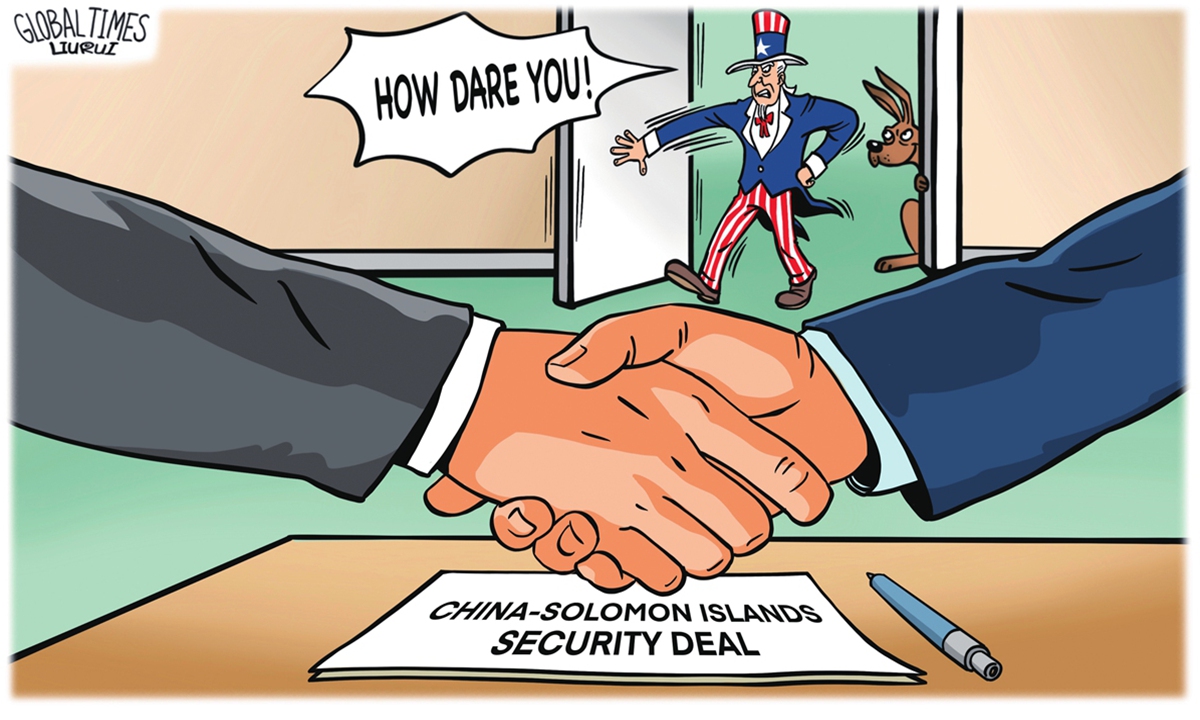Since May, the US has accelerated the promotion of its so-called Indo-Pacific Strategy, and launched a diplomatic offensive around China. The South Pacific region has been unilaterally listed by the US in its Indo-Pacific Strategy as a key part. In the joint statement from Quad leaders released in Tokyo on May 24, there is a separate paragraph emphasizing the Quad countries will further enhance cooperation with Pacific island countries. Taking the US and Australia’s words and deeds over the past few months into consideration, we can easily decipher their diplomatic rhetoric and grasp the unspoken message: The US and Australia have declared that they will “confront China” and “compete for influence” with China.
In this context, it is not difficult to understand the attempt of the US and Australia to disrupt the cooperation between China and South Pacific island countries. Before Wang’s visit, State Department spokesperson Ned Price said that the US is concerned that China is seeking to reach agreements with Pacific island nations in what may be a rushed, non-transparent process. Australia’s new foreign affairs minister, Penny Wong, who assumed the position four days earlier, hastily traveled to Fiji ahead of Wang’s visit. Australian Prime Minister Anthony Albanese said bluntly the former government had “dropped the ball” in its engagement with the Pacific and Australia “can’t afford to do that.” This kind of attention paid to the region is actually a contempt for the sovereignty of the South Pacific island countries, restricting those island countries’ normal international exchanges by posing to be their “parents.” This is precisely what the South Pacific island countries which have a growing sense of independence and autonomy most resent.
For Washington, the South Pacific region has long been synonymous with “nuclear weapons testing grounds” and “nuclear waste dumping grounds,” while Australia blatantly calls the region its “backyard.” In February, US Secretary of State Antony Blinken visited Fiji in a rushed manner. Acting Fijian Prime Minister Aiyaz Sayed-Khaiyum bluntly said there was a general feeling in Pacific island countries that “Washington is talking about us, not talking to us.” Everyone knows that if it weren’t for China, the US and Australia would probably not have bent over to look at those South Pacific island countries. Climate change is the very issue that South Pacific island countries most care about. In November, when former Australian prime minister Scott Morrison spoke at the UN Climate Summit, he even referred to “tackling climate change” as “tackling China.” He spoke his mind.
Among all the accusations made by the US and Australia to smear and attack Wang’s trip to the South Pacific, the most absurd version is that “cooperation between China and South Pacific island countries will trigger a new Cold War.” By saying so, they are exposing themselves. But we can understand the various behaviors of the US and Australia from this perspective, and strongly warn them not to introduce a “new Cold War” into the South Pacific, the Asia-Pacific, and anywhere in the world.
We have seen that South Pacific island countries, which are regarded as “kindergarten children” by the US and Australia, still remain sober and calm in the face of coercion and inducements from Washington and Canberra. They do not want to be dragged into the geopolitical competition between major powers, but they always focus on climate change, ocean governance and sustainable development. They welcome all countries with goodwill and sincerity, showing the maturity and rationality of diplomacy. One of the reasons why China’s relations with South Pacific countries can develop so fast is that everyone refuses to fall into Washington’s playbook, and it is even more impossible for them to be confined to the circle defined by Canberra.
The people of South Pacific island countries hope to be respected and live a good life. At an international conference, some Australian scholars shared their experience of visiting these countries in recent years: When they got off the plane, they saw that the airport runway and terminal building were renovated; everything was different from 10 years ago. The local people have made money by working in Chinese enterprises, and their living standards have improved significantly. They asked themselves: What did we do in the island countries before?
In the first stop of his visit to the Solomon Islands, Wang pointed out when answering a reporter’s question, “Pacific island countries are all sovereign and independent countries. They are not the backyard of anyone. All the Pacific Island countries are entitled to make their own choice instead of being just mere followers of others.” Practice has proven that, in the face of China’s insistence on mutual respect, equality and mutual benefit, and common development, the “suzerain” style of a bossy attitude has gone against the will of the people. The US and Australia can “be themselves” as much as possible, but times have changed. Eventually they will realize who is actually the one unwelcome in the Pacific.



